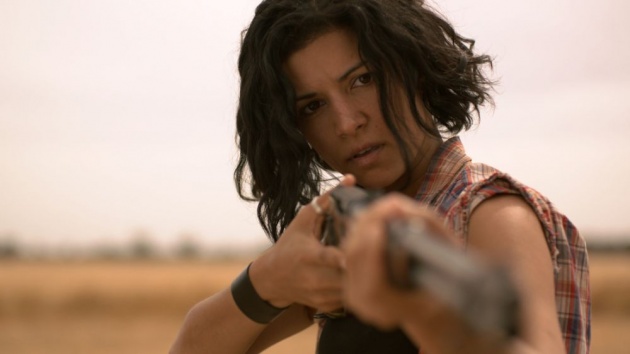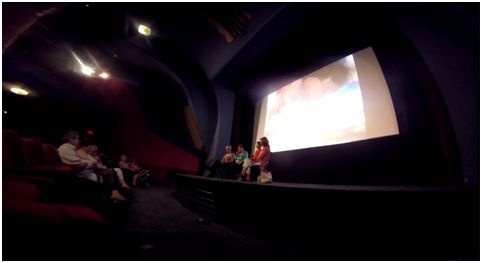
At some point during the writing of All About E, or maybe during a crackly telephone conversation that led to the idea, the following words may have been exchanged.
‘I’m writing a love story about a lesbian.’
‘A Lebanese woman?’
‘No Mum, a lesbian.’
‘A Lebanese lesbian?’
‘No. Wait, Mum – that’s brilliant.’
‘What’s brilliant about being Lebanese? Do you follow the Middle East?’
‘I didn’t know you were on Twitter.’
‘I would be – but I can’t follow the accents.’
OK. That conversation probably didn’t take place. But there is some super secret reason why Australian-born but British-trained writer-director Louise Wadley made her heroine Lebanese. Why? ‘Why not,’ she retorted to the numerous people who asked. In my book, you write what you know, because if you write what someone else knows, that’s called plagiarism. If you write what you don’t know, that’s a law suit waiting to happen. If you write what you should know, that’s called revision.
All About E is Wadley’s feature debut and tells the story of a young Lebanese DJ, known simple as E (Mandahla Rose) who desperately wants to play a gig closer to her ethnic origin (‘Arabian Nights’ – has she read it?) but ends up dressing as a matador. Why a matador? She takes a load of bull. E and her camp costume designer flatmate, Matt (Brett Rogers) wake up with a bag of cash that doesn’t belong to them. They do what any characters in a genre film would think of doing – they run away. Now a bag of cash isn’t a reason to leave one’s life behind, it’s a flimsy excuse for a chase movie.
Suddenly I find myself thinking of Sticky Fingers (director: Catlin Adams, 1988) about two New York women (Melanie Mayron, Helen Slater) asked to mind a bag of money. They are hand-to-mouth musicians, for goodness sake, who cannot resist a little peek and – oh my Reginald!
No-one remembers Sticky Fingers but it is a reminder that a film about characters who happen on a bag of money don’t end well, don’t begin well, don’t even middle well.
The biggest problem with this as a story idea is that the two characters on the run already know each other. So they rely on third party comedy theft - that is, minor characters stealing scenes. Wadley’s best idea is to have E introduce Matt to her parents, to whom she was always a Disappointment (E is a capital D). So there is about five minutes of parental befuddlement about ‘who is the boy dating my daughter?’
You need a third character to change the light bulb. She is Trish (Julia Billington), the love of E’s life. Who knew E and T could go together? Trish does good flashback, but the couple split apart because E wouldn’t tell her parents about her. (What about Trish’s parents? That’s what I wanted to know.)
The film’s dramatic conflict can be summed thusly: E needs to come out. But Wadley didn’t want to make a coming-out drama. What a cliché!
The road movie plot takes E and Matt to Trish’s failing ranch. Not many buildings out there – no ranch dressing. E and T rub two sticks together and there is a lesbian love scene, which seems to me like cramp avoidance – as opposed to camp avoidance, which isn’t the case in this movie.
The nominal villain, Scottish accented Johnny Rocks (Simon Bolton, in reality a regular guy, who had given up his big dream to be an actor until his old friend Wadley gave him a call) finds Trish’s address.
The most remarkable scene is an early confrontation between E and some archetypal Australian homophobes, whom she manages to strike with Catwoman-like prowess. The fight scene was so unconvincing, I expected caption cards like ‘pow’, ‘biff’ and ‘credit to be determined’ to appear as E kicked B.
Suddenly I find myself thinking of Tank Girl (director: Rachel Talalay, 1995) another film with an unconvincing female action hero, there played by Lori Petty. Tank Girl is set in 2033 – it could happen, people!
The big climactic features a plane – we are in Wild Geese territory, as the only way E can escape is if she gets on it. I wonder what the pilot thought if there was a chance he wouldn’t get paid – after all, Trish’s ranch is failing.
Trish gets through to E by giving her a premium instrument and that, people, isn’t a euphemism – it’s a clarinet. Trish understands that E wanted to be a jazz musician of a sort, to make her parents happy.
The problem with making a first film like All About E is that it defines you as a filmmaker. You can film a love scene and rustle up a plane on a six hundred thousand Australian dollar budget but it doesn’t exactly shriek, ‘next Jane Campion or Jocelyn Moorhouse’. Wadley is seeking AUS$ 26 million for a period drama as her next feature, a biopic about Mary Anning, who as a young girl was who was struck by lightning and suddenly became really clever, becoming a pre-eminent fossil collector and seller in Lyme Regis, England. (See: www.strangescience.net/anning.htm). To convince backers that she is the best director for this story and that there is a market for it, she’ll need a lot more than a lightning strike.
In the interest of unbiased reporting, All About E was screened at a packed East London cinema on a Sunday afternoon and the audience, some of whom had backed the movie through crowd funding, seemed genuinely appreciative. DVDs were also on sale afterwards, meaning that the chance of a proper cinema release in the UK was exactly nil. Wadley rightly complained that her film was excluded from this year’s Flare, aka the London Lesbian and Gay Film Festival – I mean, they say Lesbian, but most of the films are by men – how about 50/50, BFI? There is undoubtedly an audience who have never seen Sticky Fingers and who would enjoy an escapist road movie. The film is notable for its location, Trundle, which has never been seen in a movie before – the film’s Australian premiere was held there. I liked the fact the good people of Trundle helped the lesbians, Wadley and her producer partner Jay Rutovitz, when a location fell through, because in Trundle, a handshake means something, as opposed to North London where a handshake means, thank you for acting as my towel, the dryer was broken.
Let’s hear it for Trundle, the next great centre of Australian filmmaking – maybe.
Reviewed at Rio Dalston, Sunday 8 May 2016, 15:00, UK premiere in the presence of Louise Wadley, Jay Rutowitz and Simon Bolton, who isn’t Scottish and did not take a part away from a Scottish actor, really




